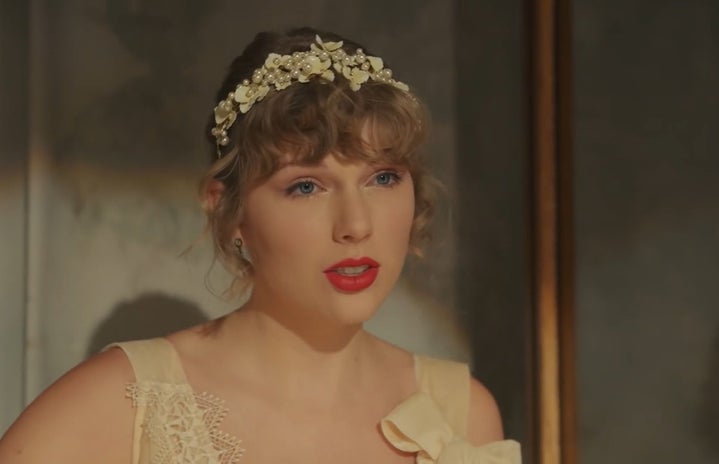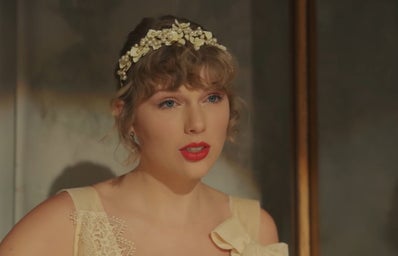I’ll just come right out and say it: I am an ex-Taylor-Swift-hater. I’m not proud of this, but it must be said.
I grew up on Taylor Swift, her debut album and Fearless were both a large part of my childhood. I belted the karaoke version of “Teardrops On My Guitar” with my cousins at family gatherings. “Our Song” was quite literally my song. The elementary-age me loved everything about Taylor Swift, growing up in a small town and seeing a beautiful, kind, fellow small town country girl make it big. At this time period, Taylor was a role model, a picture of perfection, and everything our parents wanted us to be. She was innocent. She spoke with a soft smile and level of kindness that could never be mistaken. She was what I– and many others– were taught a lady should be: dainty, soft-spoken, and sweet.
But as I grew up, so did Taylor Swift. Her music transformed from young, clueless love stories to songs that held more truth and experience. By the time I was making my way through middle school, I left my Taylor Swift days behind. I was no longer interested in her music, and I categorized her as a basic celebrity that all girls liked, so I didn’t want to.
When Taylor began publicly dating well-known celebrities, her image began to get dragged through the mud. I regret the fact that I contributed, as a middle schooler, to this gross idea that she was troubled or crazy because she made her way through a number of short-term relationships. When Taylor started dating Harry Styles, member of One Direction, the boyband that I had become absolutely obsessed with, I senselessly hopped on one of the largest bandwagons ever and decidedly started hating her.
But I know that I was not alone in this. Taylor Swift’s romantic life became a hot topic of conversation and a reason to shame her. During this same time period, a music award interviewer speculated, to her face, that Taylor might not just go home with awards that night, but lots of men. This kind of casual public ridicule is what made the hatred of Taylor so heavily normalized and acceptable.
And so followed the shaming of her music. If you had asked anyone, at this point, who Taylor Swift was, the answer would no longer be a sweet, small town girl who made it big. She would now be known as the girl who dates a lot of men only to turn around and write songs about them. Don’t date Taylor, the headlines said, because she’ll write a song about you and ruin your life. Nevermind the fact that every other artist does the same exact thing and pulling inspiration from personal experience is precisely what one does when writing a song. When Taylor did it, it was wrong, though we would have never known which man sparked inspo for which song if we were not so hyper-focused on her dating history.
What I regret not seeing the most, and fully recognize now, is that while we were shaming Taylor Swift for “getting around” and going crazy writing songs about her exes, she was producing beautiful, lyrically-advanced songs, with subject matters heavier than ever before, and references that were going way over our heads. Dear John references an emotionally abusive relationship between Taylor and John Mayor, which occurred when Taylor was only 19 and Mayor was 32. Her lyrics uncover that not only was she too young for this relationship, but Mayer had clearly exhibited abusive behaviors. The lyrics, “Counting my footsteps, Praying the floor won’t fall through, again,” and “I lived in your chess game, But you changed the rules every day” both illustrate exactly how it feels to be caught up in a damaging relationship with a manipulative partner. However, the world was not focused on the emotional story behind the lyrics, and the possible trauma that could ensue after being put through something so heavy, so young. Rather, the focus was that Taylor had the nerve to write about the famous country star, and even put his name in the title– completely ignoring the genius double entendre, as a “Dear John” letter is known as the term for a letter written to a partner to inform them that a relationship is over.
It’s taken me until recently to realize that my hatred for Taylor Swift was never about her character at all. It was entirely created by the internalized misogyny placed in me by society. A society that tells us that a woman is less pure or valuable when they date many men– a society that frowns upon women embracing their sexuality as well as their romantic life. And when hating Taylor became default for so many and her name became a joke, we all passively agreed to channel our sexism and hatred towards her, letting her name be the bearer of all of our sexist ideas about women as a whole.
Taylor becomes aware of this double standard. In her song “The Man”, she says, “They’d say I played the field before I found someone to commit to, And that would be okay, For me to do, Every conquest I had made would make me more of a boss to you.” These lines clearly call out the double standard that takes place in the dating world– men receive accolades and praise as they date and sleep with more women, while women are shamed if they do the same exact things. For women, it becomes taboo, and we are deemed promiscuous and easy. Women aren’t granted the same permission to explore different relationships and uncover their likes or desires before committing.
And even when Taylor wasn’t being scrutinized for her love life, she suffered through the humiliation of her talent being put into question. While it’s okay to not like pop music, the general consensus was that she just did not deserve her place in the music industry– she was just a dumb girl with horrible music. Society rejected that she might have an ounce of talent, failing to acknowledge that she had gotten where she was due to her songwriting ability and hard work. The world that once put her on a pedestal when she was a quiet, small town country girl, knocked her right off and undermined her talent and deservedness of such a platform when she grew up. We could discuss how such inability to acknowledge female accomplishment and success is rooted in misogyny, but I digress. However, in her documentary, Miss Americana, Taylor weighs in on the clear sexism in the music industry. She explains how female artists have to reinvent themselves twenty times more than male artists. And it’s true- as women become older they don’t become “better with age” as men do, they are just no longer appealing. Women have to stay young, stay hot, and appease everyone in order to stay relevant, or they will fall off.
Sadly, it doesn’t end here. If society wasn’t shaming her dating habits or speculating about her talent and deservedness of awards, it was fixated on her body. While she was known for her thin figure, she noticeably lost even more weight, becoming an easy target for skinny-shamers everywhere. Her figure was plastered on magazine covers, her weight becoming yet another reason to crucify her. Discussions of her weight were never positive– publications speculated about whether or not she was too skinny or if she was starving herself. Body-shaming Taylor was casual, skinny became synonymous with her name. It’s yet another example that proves women’s bodies are simply objects to be commented on and criticized. And though the world was angry at Taylor for being so thin, her recent weight gain was not met with praise. Yet again, the world erupted over how much larger she has become, pointing out her thighs and tummy. She recently revealed that her thin figure was not natural and she was engaging in disordered eating behaviors in order to stay thin and avoid public scrutiny over any ounce of fat on her body. But the world doesn’t celebrate Taylor’s recovery and healthier build, which makes it very clear: women are damned if they do, and damned if they don’t.
And so, I apologize on behalf of my younger self. I’m ashamed that the misogyny instilled inside of me led me to project such hatred on another woman. I’m ashamed because I see a lot of myself in Taylor Swift, and this type of misogyny is present in us everyday. A lot has to change if we want to change the way the world views women.
Maybe it starts by asking ourselves why we aren’t fond of Taylor Swift.

